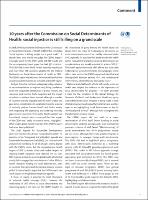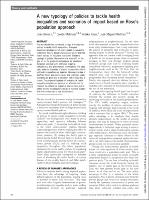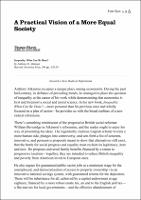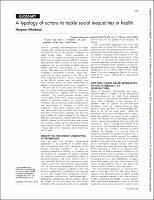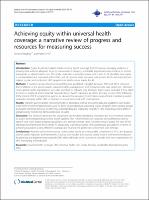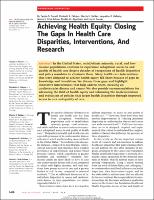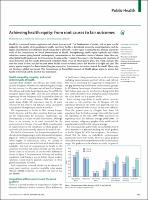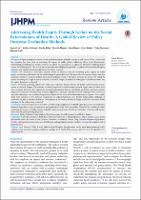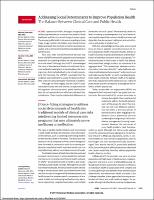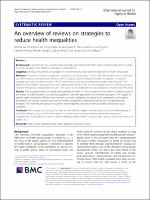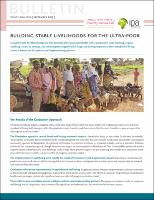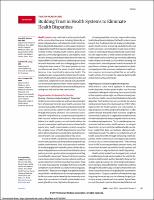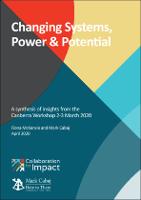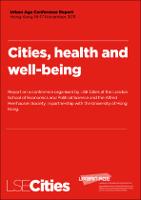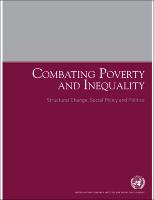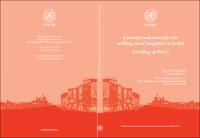Browsing 1.02.02 Health in All Policies by Title
Now showing items 1-20 of 51
-
A new typology of policies to tackle health inequalities and scenarios of impact based on Rose's population approach
(Journal of Epidemiology and Community Health, 2013)
The last decade has witnessed a surge in interest for policies to tackle health inequalities. Adequate theoretical development of policy models is needed to understand how to design and evaluate equity-oriented health policies. In this paper we review Graham’s typology of policies (focused on the worst-off, on the gap, or on the gradient) and propose an adaptation (targeted, universal with additional targeting, redistributive, and proportionate universalism). For each type, potential scenarios of impact on population health and health inequalities ... -
A Practical Vision of a More Equal Society
(2015)
Toward a New Radical Reformism Anthony Atkinson occupies a unique place among economists. During the past half-century, in defiance of prevailing trends, he managed to place the question of inequality at the center of his work while demonstrating that economics is first and foremost a social and moral science. In his new book, Inequality: What Can Be Done?—more personal than his previous ones and wholly focused on a plan of action—he provides us with the broad outlines of a new radical reformism. -
A Practitioner’s Guide for Advancing Health Equity: Community Strategies for Preventing Chronic Disease
(2013)
The intention of A practitioner’s guide for advancing health equity is to help practitioners and leaders incorporate a health equity view in their collaborations with community organizations. It offers ideas — with stories to illustrate — for how public health organizations can develop competency in the important work of building organizational capacity, engaging communities, developing partnerships and coalitions, and making the case for health equity. Each of the four sections of the Practitioner’s guide (1. foundational skills, 2. tobacco-free ... -
A typology of actions to tackle social inequalities in health
(Journal of Epidemiology & Community Health, 2007) -
Achieving equity within universal health coverage: a narrative review of progress and resources for measuring success
(2014)
Introduction: Equity should be implicit within universal health coverage (UHC) however, emerging evidence is showing that without adequate focus on measurement of equity, vulnerable populations may continue to receive inadequate or inferior health care. This study undertakes a narrative review which aims to: (i) elucidate how equity is contextualised and measured within UHC, and (ii) describe tools, resources and lessons which will assist decision makers to plan and implement UHC programmes which ensure equity for all. Methods: A narrative review ... -
Achieving Health Equity: Closing The Gaps In Health Care Disparities, Interventions, And Research
(2016)
In the United States, racial/ethnic minority, rural, and lowincome populations continue to experience suboptimal access to and quality of health care despite decades of recognition of health disparities and policy mandates to eliminate them. Many health care interventions that were designed to achieve health equity fall short because of gaps in knowledge and translation. We discuss these gaps and highlight innovative interventions that help address them, focusing on cardiovascular disease and cancer. We also provide recommendations for advancing ... -
Achieving health equity: from root causes to fair outcomes
(The Lancet, 2007) -
Addressing Health Equity Through Action on the Social Determinants of Health: A Global Review of Policy Outcome Evaluation Methods
(Kerman University of Medical Sciences, 2018-02-06)
Background: Epidemiological evidence on the social determinants of health inequity is well-advanced, but considerably less attention has been given to evaluating the impact of public policies addressing those social determinants. Methodological challenges to produce evidence on policy outcomes present a significant barrier to mobilising policy actions for health equities. This review aims to examine methodological approaches to policy evaluation of health equity outcomes and identify promising approaches for future research. Methods: We conducted ... -
An overview of reviews on strategies to reduce health inequalities
(2020-12)
Background: Governments are incentivized to develop and implement health action programs focused on equity to ensure progress with effective strategies or interventions. Objective: Identify and synthesize strategies or interventions that facilitate the reduction of health inequalities. Methods: A systematic search strategy was carried out up until August 2019 in MEDLINE (Ovid), Embase (Elsevier), Cochrane Database of Systematic Reviews, LILACS, Scopus, Scielo and Epistemonikos. In addition, a snowball strategy was used. Literature reviews (LRs) ... -
Building stable livelihoods for the ultra-poor
(J-PAL and IPA Policy Bulletin., 2015) -
Building Trust in Health Systems to Eliminate Health Disparities
(JAMA, 2019-07-09) -
Changing Systems, Power & Potential
(2020-03)
Mark Cabaj, President of the Canadian consulting company From Here to There and an Associate of Tamarack – An Institute for Community Engagement, worked with CFI to deliver a two-day workshop in March 2020 on Changing Systems, Power and Potential. CFI Network member Fiona McKenzie observed and synthesised the learnings, discussions and perspectives into a report which captures contributions from both presenters and participants. The result is a blend of concepts, frameworks, applications, hints and common threads that emerged about efforts to ... -
Cities, health and well-being
(2012)
Cities are critical sites for enquiry and action in relation to health and well-being. With up to 70 per cent of the world’s population estimated to be living in urban areas by 2050, global health will be determined increasingly in cities. In response to these challenges, the 2011 Urban Age Hong Kong conference, organized by the London School of Economics and Political Science and the Alfred Herrhausen Society in partnership with the University of Hong Kong, brought together over 170 planners, architects, sociologists, medical doctors, public ... -
Closing the health equity gap: policy options and opportunities for action
(World Health Organization, 2013)
This report, which highlights policy options for consideration within national discussions, was developed in conjunction with WHO regional offices and others across the Organization who are working on the social determinants of health and equity issues. The general approach to the report was discussed at a seminar within WHO’s Information, Evidence and Policy cluster and with WHO regional advisors following the release of the final report of the Commission on Social Determinants of Health in August 2008. In January 2009 the 124th session of the ... -
Combating poverty and inequality: structural change, social policy and politics
(United Nations Research Institute for Social Development, 2010)
Poverty reduction is a central feature of the international development agenda and contemporary poverty reduction strategies increasingly focus on “targeting the poor”, yet poverty and inequality remain intractable foes. Combating Poverty and Inequality argues that this is because many current approaches to reducing poverty and inequality fail to consider key institutional, policy and political dimensions that may be both causes of poverty and inequality, and obstacles to their reduction. Moreover, when a substantial proportion of a country’s ... -
Conceptions of Social Enterprise and Social Entrepreneurship in Europe and the United States: Convergences and Divergences
(Journal of Social Entrepreneurship, 2010)
The concepts of social enterprise and social entrepreneurship are making amazing breakthroughs in EU countries and the United States. Until recently, the debates on both sides of the Atlantic have taken place in parallel trajectories with few connections among them. In the first part of the paper, we describe the European and US historical landscapes in which those concepts took root. In the second part, we analyse how the various conceptualizations have evolved. This analysis paves the way for the third part, in which we highlight the conceptual ... -
Deconstructing development discourse: buzzwords and fuzzwords
(Practical Action Pub. ; Oxfam, 2010)
"Writing from diverse locations, contributors critically examine some of the key terms in current development discourse. Why should language matter to those who are doing development? Surely, there are more urgent things to do than sit around mulling over semantics? But language does matter. Whether emptied of their original meaning, essentially vacuous, or hotly contested, the language of development not only shapes our imagined worlds, but also justifies interventions in real people's lives. If development buzzwords conceal ideological differences ...

